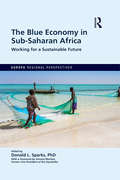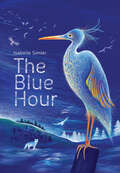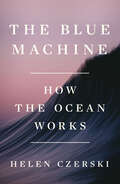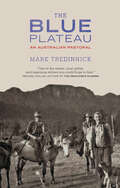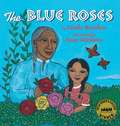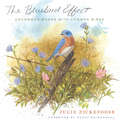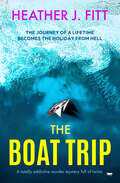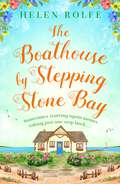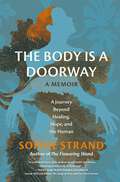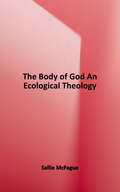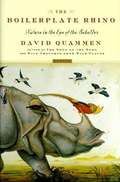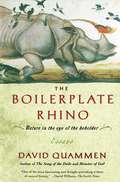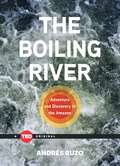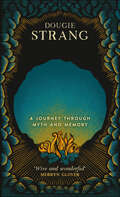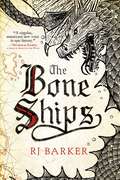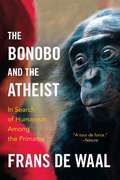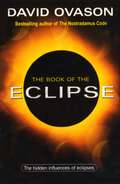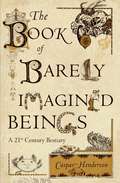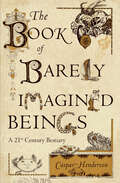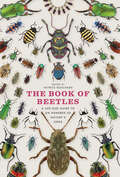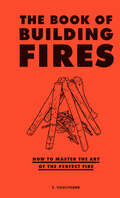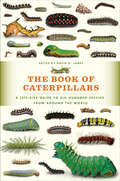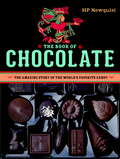- Table View
- List View
The Blue Economy in Sub-Saharan Africa: Working for a Sustainable Future (Europa Regional Perspectives)
by Donald L. SparksThe blue economy, comprising coastal and marine resources, offers vast benefits for sub-Saharan Africa: of the 53 countries and territories in the region, 32 are coastal states; there are 13 million sq km of maritime zones; more than 90% of the region’s exports and imports come by sea; and the African Union hails the blue economy as the ‘new frontier of African renaissance’. Despite their importance, the region’s coastal and marine resources have been neither fully appreciated nor fully utilized. They are only now being recognized as being key to Africa’s potential prosperity. As the region grows, it has, in general, not taken adequate safeguards to protect these valuable resources. That is partly because some of the problems (pollution, for example) are regional and know no borders. All too often, short-term gains are made at the expense of the long term (overfishing, for example). This book provides, for the first time, a study of the constraints and opportunities the blue economy offers for sub-Saharan Africa. It includes an introduction and overview; sectoral analyses (including tourism, fisheries, mineral resources, culture, shipping and maritime safety); country case studies; and analyses of regional and international efforts towards better coastal zone and marine management.
The Blue Hour
by Isabelle SimlerA lovely and tranquil celebration of natureThe sun has set, the day has ended, but the night hasn't quite arrived yet. This magical twilight is known as the blue hour. Everything in nature—sky, water, flowers, birds, foxes—comes together in a symphony of blue to celebrate the merging of night and day. With its soothing text and radiant artwork, this elegant picture book displays the majesty of nature and reminds readers that beauty is fleeting but also worth savoring.
The Blue Machine: How The Ocean Works
by Helen CzerskiA Financial Times Best Science Book of 2023 “[A] profound, sparkling global ocean voyage.” —Andrew Robinson, Nature A scientist’s exploration of the "ocean engine"—the physics behind the ocean’s systems—and why it matters. All of Earth’s oceans, from the equator to the poles, are a single engine powered by sunlight, driving huge flows of energy, water, life, and raw materials. In The Blue Machine, physicist and oceanographer Helen Czerski illustrates the mechanisms behind this defining feature of our planet, voyaging from the depths of the ocean floor to tropical coral reefs, estuaries that feed into shallow coastal seas, and Arctic ice floes. Through stories of history, culture, and animals, she explains how water temperature, salinity, gravity, and the movement of Earth’s tectonic plates all interact in a complex dance, supporting life at the smallest scale—plankton—and the largest—giant sea turtles, whales, humankind. From the ancient Polynesians who navigated the Pacific by reading the waves, to permanent residents of the deep such as the Greenland shark that can live for hundreds of years, she introduces the messengers, passengers, and voyagers that rely on interlinked systems of vast currents, invisible ocean walls, and underwater waterfalls. Most important, however, Czerski reveals that while the ocean engine has sustained us for thousands of years, today it is faced with urgent threats. By understanding how the ocean works, and its essential role in our global system, we can learn how to protect our blue machine. Timely, elegant, and passionately argued, The Blue Machine presents a fresh perspective on what it means to be a citizen of an ocean planet.
The Blue Plateau: An Australian Pastoral
by Mark TredinnickThe author of The Land’s Wild Music depicts Australia’s Blue Mountains through stories of the land and the lives within it.At the farthest extent of Australia’s Blue Mountains, on the threshold of the country’s arid interior, the Blue Plateau reveals the vagaries of a hanging climate: the droughts last longer, the seasons change less, and the wildfires burn hotter and more often. In The Blue Plateau, Mark Tredinnick tries to learn what it means to fall in love with a home that is falling away.A landscape memoir in the richest sense, Tredinnick’s story reveals as much about this contrary collection of canyons and ancient rivers, cow paddocks and wild eucalyptus forests as it does about the myriad generations who struggled to remain in the valley they loved. It captures the essence of a wilderness beyond subjugation, the spirit of a people just barely beyond defeat. Charting a lithology of indigenous presence, faltering settlers, failing ranches, floods, tragedy, and joy that the place constantly warps and erodes, The Blue Plateau reminds us that, though we may change the landscape around us, it works at us inexorably, with wind and water, heat and cold, altering who and what we are.The result is an intimate and illuminating portrayal of tenacity, love, grief, and belonging. In the tradition of James Galvin, William Least Heat-Moon, and Annie Dillard, Tredinnick plumbs the depths of people’s relationship to a world in transition.Praise for The Blue Plateau“One of the wisest, most gifted and ingenious writers you could hope to find.” —Michael Pollan, author of In Defense of Food and The Omnivore’s Dilemma“I’ve never been to Australia, but now—after this book—it comes up in my dreams. The landscape in the language of this work is alive and conscious, and Tredinnick channels it in prose both wild and inspired. . . . Part nonfiction novel, part classic pastoral, part nature elegy, part natural history, the whole of The Blue Plateau conveys a deep sense, rooted in the very syntax of a lush prose about an austere land, that there can be no meaningful division between nature and culture, between humans and all the other life that interdepends with us, not in the backcountry of southeastern Australia, nor anywhere else.” —Orion“Absorbed slowly, as a pastoral landscape of loss and experiment in seeing and listening, the book richly rewards that patience.” —Publishers Weekly
The Blue Roses
by Linda BoydenA Native American girl gardens with her grandfather, who helps to raise her, and learns about life and loss when he dies, and then speaks to her from a dream where he is surrounded by blue roses.
The Bluebird Effect
by Julie ZickefooseJulie Zickefoose lives for the moment when a wild, free living bird that she has raised or rehabilitated comes back to visit her; their eyes meet and they share a spark of understanding. Her reward for the grueling work of rescuing birds--such as feeding baby hummingbirds every twenty minutes all day long--is her empathy with them and the satisfaction of knowing the world is a birdier and more beautiful place.The Bluebird Effect is about the change that's set in motion by one single act, such as saving an injured bluebird--or a hummingbird, swift, or phoebe. Each of the twenty five chapters covers a different species, and many depict an individual bird, each with its own personality, habits, and quirks. And each chapter is illustrated with Zickefoose's stunning watercolor paintings and drawings. Not just individual tales about the trials and triumphs of raising birds, The Bluebird Effect mixes humor, natural history, and memoir to give readers an intimate story of a life lived among wild birds.
The Boat Trip: A totally addictive murder mystery full of twists
by Heather J FittIn this brand-new murder mystery by the author of The Flight, a yacht crosses the North Atlantic while a perfect storm of suspicion and vengeance develops onboard . . .Duchess is about to set sail from Scotland to St. Lucia. But before she even leaves port, an argument erupts. It&’s only the first in a series of unsettling events that will beset Helen, the skipper, her best friend, and the remaining crew. During a port of call in the Canary Islands, tensions mount further when an unexpected guest joins the crew. Then, a near-fatal allergic reaction raises the pressure level—and finally, during a fierce storm, someone goes overboard . . . Is this a run of bad luck or is one person at the heart of the turmoil and violence? And if so, can the culprit be identified before they reach the Caribbean?
The Boathouse by Stepping Stone Bay
by Helen Rolfe'Comforting and uplifting, this book is a joy to read' - MY WEEKLY, on The Farmhouse of Second ChancesSun, sand and secrets at the bay!As a kid, Nina O'Brien spent all her summers at her grandparents' cabin by the beach at Stepping Stone Bay. Long, sunny days full of fun and laughter with her best friends, Leo, Adrian, and Maeve, her friendship with Leo slowly blossoming into love. Until one fateful night changed everything for them all... Twelve years later, Nina must return to the bay to renovate the old cabin and pass it on to a new owner. But not only does Leo still live in the cabin next door, he works at his family's boathouse right there in the bay. As they begin to work through their differences and what happened all those years ago, can Nina really walk away from him twice? Maeve has finally returned home to face the past. Her eleven-year-old son, Jonah, loves the sea, unlike Maeve who is terrified of it. But she knows she can't keep Jonah away from the sea or the truth forever..A heartwarming and uplifting story about second chances and facing the secrets of the past. Perfect for fans of Philippa Ashley, Holly Martin and Ali McNamara. Readers adore Helen's heartwarming storytelling'Enchanting... Employing all the warmth and charm of Maeve Binchy, and a special brand of kindness that she has made her own, Rolfe weaves together elements of mystery, romance, family relationships and the warmth of community in a story guaranteed to bring laughter, tears and miles of smiles' Lancashire Post'A warm, comforting tale of family and community which brims with kindness and love' Annie Lyons'A heartwarming story about family, forgiveness and the importance of kindness... If you're looking for a feelgood novel in these difficult times, this is definitely it!' Fiona Harper'A lovely community, full of friendship and love''I enjoyed every minute of this book and found it very hard to put down''Lovely, feel-good...filled with lots of love''Gave you all the emotions: suspense, happiness and excitement''Helen Rolfe's writing brought a smile to my face''Loved loved loved this fabulous book'
The Boatman: Henry David Theoreau's River Years
by Robert M. ThorsonRobert Thorson gives readers a Thoreau for the Anthropocene. The boatman and backyard naturalist was keenly aware of the way humans had altered the waterways and meadows of his beloved Concord River Valley. Yet he sought out for solace and pleasure those river sites most dramatically altered by human invention and intervention—for better and worse.
The Body Is a Doorway: A Journey Beyond Healing, Hope, and the Human
by Sophie StrandA LIT HUB MOST ANTICIPATED BOOK OF 2025 In this lyrical, radically expansive self-portrait, celebrated poet, author, and lecturer Sophie Strand explores—with searing insight and honesty—the intersecting spaces of her own chronic illness, the complex ecology of a changing world, and the very nature of the stories we tell ourselves. At age sixteen Sophie Strand—bright, agile, fearless—is suddenly beset by unexplained, debilitating illness while on a family trip abroad. Her once vibrant life becomes a tangled miasma of medication, specialists, anaphylaxis, and seemingly never-ending attempts to explain what has gone so terribly wrong. And, for many years thereafter, Sophie's life becomes subsumed with ideas not of "health," but of explanation, and the narrative of how and why she became sick. But slowly, through both profound fatigue with the medical industrial complex and a deeply entwined relationship with the natural world, she comes to another, more fundamental understanding of what has happened to her body. What if sickness is not a separation from the body? What if health is not quite so easy to see? What if physical pain leaves us no choice but to return to our bodies, the pinpricks and lightning of illness stitching us back into a physical presence our society has taught us to ignore? In a work both expansively tender and shockingly frank, Sophie Strand offers readers a window onto her own winding journey through the maze of chronic illness—a web not unlike those created by the mycorrizhal fungi whose networks she begins to see as a metaphor for the profound connections between all species and the earth. Grounded deeply in the mountains of the Hudson Valley, each moment of this far-reaching narrative snakes its way through the multi-layered ecology of the land around us, from the stunningly powerful pollen of a phlox plant to the unexpected beauty and wisdom of the woodchuck. The Body Is a Doorway dives into the murky waters of sickness and trauma, as well as the resonant challenges and joys of friendship, young adulthood, first love, and fertility. Throughout, in precise, sparkling language, it explores questions both personal and universal: Is there healing beyond the human? Beyond the hope for a cure or a happy ending? Is there something wilder and more symbiotic beyond narrow ideas of well-being?
The Body of God: An Ecological Theology
by Sallie McFagueAward-winning theologian Sallie McFague here develops a striking and novel vision of the universe, one that takes seriously and radically both contemporary science and the incarnational commitments of the Christian tradition.
The Boilerplate Rhino: Nature in the Eye of the Beholder
by David QuammenThe author hailed by Edward O. Wilson as "a brilliant young star of nature writing" explores the relationship between humans and the natural world in a collection of essays culled from his popular "Outside" magazine column.
The Boilerplate Rhino: Nature in the Eye of the Beholder
by David QuammenIn 1981 David Quammen began what might be every freelance writer's dream: a monthly column for Outside magazine in which he was given free rein to write about anything that interested him in the natural world. His column was called "Natural Acts," and for the next fifteen years he delighted Outside's readers with his fascinating ruminations on the world around us. The Boilerplate Rhino brings together twenty-six of Quammen's most thoughtful and engaging essays from that column, none previously printed in any of his earlier books.In lucid, penetrating, and often quirkily idiosyncratic prose, David Quammen takes his readers with him as he explores the world. His travels lead him to rattlesnake handlers in Texas; a lizard specialist in Baja; the dinosaur museum in Jordan, Montana; and halfway across Indonesia in search of the perfect Durian fruit. He ponders the history of nutmeg in the southern Moluccas, meditates on bioluminescent beetles while soaking in the waters of the Amazon, and delivers "The Dope on Eggs" from a chicken ranch near his hometown in Montana. Quammen's travels are always jumping-off points to explore the rich and sometimes horrifying tension between humankind and the natural world, in all its complexity and ambivalence. The result is another irrepressible assortment of ideas to explore, conundrums to contemplate, and wondrous creatures to behold.
The Boiling River: Adventure and Discovery in the Amazon (TED Books)
by Andrés RuzoIn this exciting adventure mixed with amazing scientific study, a young, exuberant explorer and geoscientist journeys deep into the Amazon--where rivers boil and legends come to life.<P><P> When Andrés Ruzo was just a small boy in Peru, his grandfather told him the story of a mysterious legend: There is a river, deep in the Amazon, which boils as if a fire burns below it. Twelve years later, Ruzo--now a geoscientist--hears his aunt mention that she herself had visited this strange river. <P> Determined to discover if the boiling river is real, Ruzo sets out on a journey deep into the Amazon. What he finds astounds him: In this long, wide, and winding river, the waters run so hot that locals brew tea in them; small animals that fall in are instantly cooked. As he studies the river, Ruzo faces challenges more complex than he had ever imaged. <P> The Boiling River follows this young explorer as he navigates a tangle of competing interests--local shamans, illegal cattle farmers and loggers, and oil companies. This true account reads like a modern-day adventure, complete with extraordinary characters, captivating plot twists, and jaw-dropping details--including stunning photographs and a never-before-published account about this incredible natural wonder. Ultimately, though, The Boiling River is about a man trying to understand the moral obligation that comes with scientific discovery --to protect a sacred site from misuse, neglect, and even from his own discovery.
The Bone Cave: A Journey through Myth and Memory
by Dougie StrangThis is a book about stories – old stories of people and place, and of the more-than-human world. A vivid account of a journey through the Scottish Highlands, The Bone Cave follows a series of folktales and myths to the places in which they’re set. Travelling mostly on foot, and camping along the way amid some of Scotland’s most beautiful and rugged landscapes, Dougie Strang encounters a depth of meaning to the tales he tracks – one that offers a unique perspective on place, culture, land ownership and ecological stewardship, as well as insights into his own entanglement with place. Dougie sets out on his walk at the beginning of October, which also marks the start of the red deer rut. The bellowing of stags forms the soundtrack to his journey and is a reminder that, as well as mapping invisible landscapes of story, he is also exploring the tangible, living landscape of the present.
The Bone Ships (The Tide Child Trilogy #1)
by RJ BarkerA brilliantly imagined saga of honor, glory, and warfare, The Bone Ships is the epic launch of a new fantasy from David Gemmell Award-nominated RJ Barker.Two nations at war. One prize beyond compare. For generations, the Hundred Isles have built their ships from the bones of ancient dragons to fight an endless war. The dragons disappeared, but the battles for supremacy persisted. Now the first dragon in centuries has been spotted in far-off waters, and both sides see a chance to shift the balance of power in their favour. Because whoever catches it will win not only glory, but the war.Praise for The Bone Ships:"A vividly realized high-seas epic that pulls you deep into its world and keeps you tangled there until the very last word." --Evan Winter, author of The Rage of Dragons"The Bone Ships is excellent. Aside from the standout writing, it's one of the most interesting and original fantasy worlds I've seen in years." --Adrian Tchaikovsky, Arthur C. Clarke Award-winning authorThe Tide Child TrilogyThe Bone ShipsFor more from RJ Barker, check out:The Wounded KingdomAge of AssassinsBlood of AssassinsKing of Assassins
The Bones of the Earth
by Howard MansfieldThe Bones of The Earth is a book about landmarks, but of the oldest kind--sticks and stones. For millennia this is all there was: sticks and stones, dirt and trees, animals and people, the sky by day and night. The Lord spoke through burning bushes, through lightning and oaks. Trees and rocks and water were holy. They are commodities today and that is part of our disquiet. Howard Mansfield explores the loss of cultural memory, asking: What is the past? How do we construct that past? Is it possible to preserve the past as a vital force for the future? He writes eloquently on the land and time, on how to be a tourist of the near-at-hand, and on the forces that try to topple us. From the author of In the Memory House and The Same Ax, Twice comes The Bones of The Earth, a stunning call for reinventing our view of the future.
The Bonobo And The Atheist: In Search Of Humanism Among The Primates
by Frans De WaalFor many years, de Waal has observed chimpanzees soothe distressed neighbors and bonobos share their food. Now he delivers fascinating fresh evidence for the seeds of ethical behavior in primate societies that further cements the case for the biological origins of human fairness. Interweaving vivid tales from the animal kingdom with thoughtful philosophical analysis, de Waal seeks a bottom-up explanation of morality that emphasizes our connection with animals. In doing so, de Waal explores for the first time the implications of his work for our understanding of modern religion. Whatever the role of religious moral imperatives, he sees it as a "Johnny-come-lately" role that emerged only as an addition to our natural instincts for cooperation and empathy. But unlike the dogmatic neo-atheist of his book's title, de Waal does not scorn religion per se. Instead, he draws on the long tradition of humanism exemplified by the painter Hieronymus Bosch and asks reflective readers to consider these issues from a positive perspective: What role, if any, does religion play for a well-functioning society today? And where can believers and nonbelievers alike find the inspiration to lead a good life?Rich with cultural references and anecdotes of primate behavior, The Bonobo and the Atheist engagingly builds a unique argument grounded in evolutionary biology and moral philosophy. Ever a pioneering thinker, de Waal delivers a heartening and inclusive new perspective on human nature and our struggle to find purpose in our lives.
The Book Of The Eclipse
by David OvasonAs David Ovason shows, eclipse have always marked turning points in history and in the lives of individuals: the foundation of Rome, the crucifixion, the saving of the live of Christopher Columbus, the foundation of Washington DC, the death of Diana, Princess of Wales and even the future fall from grace of President Clinton are among Ovason's many examples. Ovason also shows how stone circles were linked to eclipses and how these events have always been supposed by initiates to create shadow-tunnels into the spiritual world, allowing special possibilities of communication with the spiritual world.
The Book of Barely Imagined Beings
by Caspar HendersonFrom medieval bestiaries to Borges s "Book of Imaginary Beings," we ve long been enchanted by extraordinary animals, be they terrifying three-headed dogs or asps impervious to a snake charmer s song. But bestiaries are more than just zany zoology they are artful attempts to convey broader beliefs about human beings and the natural order. Today, we no longer fear sea monsters or banshees. But from the infamous honey badger to the giant squid, animals continue to captivate us with the things they can do and the things they cannot, what we know about them and what we don t. With "The Book of Barely Imagined Beings," Caspar Henderson offers readers a fascinating, beautifully produced modern-day menagerie. But whereas medieval bestiaries were often based on folklore and myth, the creatures that abound in Henderson s book from the axolotl to the zebrafish are, with one exception, very much with us, albeit sometimes in depleted numbers. "The Book of Barely Imagined Beings "transports readers to a world of real creatures that seem as if they should be made up that are somehow more astonishing than anything we might have imagined. The yeti crab, for example, uses its furry claws to farm the bacteria on which it feeds. The waterbear, meanwhile, is among nature s extreme survivors, able to withstand a week unprotected in outer space. These and other strange and surprising species invite readers to reflect on what we value or fail to value and what we might change. A powerful combination of wit, cutting-edge natural history, and philosophical meditation, "The Book of Barely Imagined Beings" is an infectious and inspiring celebration of the sheer ingenuity and variety of life in a time of crisis and change. "
The Book of Barely Imagined Beings: A 21st Century Bestiary
by Caspar Henderson“Caspar Henderson takes us on an eye-opening tour of real animals that no sane human could ever have invented.” —Frans de Waal, New York Times–bestselling authorWith The Book of Barely Imagined Beings, Caspar Henderson offers readers a fascinating, beautifully produced modern-day menagerie. But whereas medieval bestiaries were often based on folklore and myth, the creatures that abound in Henderson’s book—from the axolotl to the zebrafish—are, with one exception, very much with us, albeit sometimes in depleted numbers. The Book of Barely Imagined Beings transports readers to a world of real creatures that seem as if they should be made up—that are somehow more astonishing than anything we might have imagined. The yeti crab, for example, uses its furry claws to farm the bacteria on which it feeds. The waterbear, meanwhile, is among nature’s “extreme survivors,” able to withstand a week unprotected in outer space. These and other strange and surprising species invite readers to reflect on what we value—or fail to value—and what we might change.A powerful combination of wit, cutting-edge natural history, and philosophical meditation, The Book of Barely Imagined Beings is an infectious and inspiring celebration of the sheer ingenuity and variety of life in a time of crisis and change.“The Book of Barely Imagined Beings is one that Pliny would have envied, Darwin applauded, and Borges relished . . . In these days of doom and gloom, I can think of nothing more rejoicing than Caspar Henderson’s magical book.” —Alberto Manguel, author of A History of Reading“Magnificent, bravura, beautiful and astoundingly interesting.” —The Sunday Times“Spell-binding, brilliantly executed, extraordinary.” —The Guardian
The Book of Beetles: A Life-Size Guide to Six Hundred of Nature's Gems
by Patrice Bouchard“Profiles 600 of the most stunning, most wonderfully adapted beetles around . . . The result is a work that is nothing short of magnificent.” —WiredWhen renowned British geneticist J. B. S. Haldane was asked what could be inferred about God from a study of his works, Haldane replied, “An inordinate fondness for beetles.” With 350,000 known species, and scientific estimates that millions more have yet to be identified, their abundance is indisputable as is their variety. They range from the delightful summer firefly to the one-hundred-gram Goliath beetle. Beetles offer a dazzling array of shapes, sizes, and colors that entice scientists and collectors across the globe.The Book of Beetles celebrates the beauty and diversity of this marvelous insect. Six hundred significant beetle species are covered, with each entry featuring a distribution map, basic biology, conservation status, and information on cultural and economic significance. Full-color photos show the beetles both at their actual size and enlarged to show details, such as the sextet of spots that distinguish the six-spotted tiger beetle or the jagged ridges of the giant-jawed sawyer beetle. Based in the most up-to-date science and accessibly written, the descriptive text will appeal to researchers and armchair coleopterists alike.The humble beetle continues to grow in popularity, taking center stage in biodiversity studies, sustainable agriculture programs, and even the dining rooms of adventurous and eco-conscious chefs. The Book of Beetles is certain to become the authoritative reference on these remarkably adaptable and beautiful creatures.“Photographs of more than 600 colorful, glossy species, resembling bejeweled broaches morethan creepy crawlies, are presented at actual size.” —Publishers Weekly
The Book of Building Fires: How to Master the Art of the Perfect Fire
by S. CoulthardLearn to construct the best fire, whether it’s in a fireplace, a woodstove, or a campsite in the great outdoors.Straightforward instruction and helpful how-to illustrations provide the wisdom and tools for building a roaring fire with confidence, skill, and efficiency—a fire that people will gather around in admiration. Filled with more than sixty entries on every aspect of fire craft, including sourcing proper wood, chopping and storing, crafting homemade fire starters, building and lighting the perfect stack, and cooking over an open flame, this book also contains a handy chart with information on more than twenty-five species of trees and their wood-burning properties. A must-have for anyone who enjoys the simple satisfaction of gathering around a warm, crackling fire, here is an invitation to celebrate the gifts of slow living and one of life’s most enduring pleasures.
The Book of Caterpillars: A Life-Size Guide to Six Hundred Species from Around the World
by David G. James“For the lover of all things lepidopterous, The Book of Caterpillars is a beautifully curated collection and guide to 600 species from around the globe.” —The American Biology TeacherWhile most of us picture caterpillars as cute fuzzballs munching on leaves, there is much more to them than we imagine. A caterpillar’s survival hinges on finding enough food and defending itself from the array of natural enemies lined up to pounce and consume. And the astounding adaptations and strategies they have developed to maximize their chances of becoming a butterfly or moth are only just beginning to be understood, from the Spicebush Swallowtail caterpillar that resembles a small snake to the Eastern Carpenter Bee Hawkmoth caterpillar that attempts to dissuade potential predators by looking like a diseased leaf.The Book of Caterpillars unveils the mysteries of six hundred species from around the world, introducing readers to the complexity and beauty of these underappreciated insects. With the advent of high-quality digital macrophotography, the world of caterpillars is finally opening up. The book presents a wealth of stunning imagery that showcases the astonishing diversity of caterpillar design, structure, coloration, and patterning. Each entry also features a two-tone engraving of the adult specimen, emphasizing the wing patterns and shades, as well as a population distribution map and table of essential information that includes their habitat, typical host plants, and conservation status. Throughout the book are fascinating facts that will enthrall expert entomologists and curious collectors alike.A visually rich and scientifically accurate guide to six hundred of the world’s most peculiar caterpillars, this volume presents readers with a rare, detailed look at these intriguing forms of insect life.
The Book of Chocolate: The Amazing Story of the World's Favorite Candy
by Hp NewquistChocolate . . . - Its scientific name means “food of the gods.”- The Aztecs mixed it with blood and gave it to sacrificial victims to drink.- The entire town of Hershey, Pennsylvania was built by Milton Hershey to support his chocolate factory. Its streetlights are shaped like chocolate Kisses.- The first men to climb to the top of Mount Everest buried a chocolate bar there as an offering to the gods of the mountain.- Every twenty-four hours, the U.S. chocolate industry goes through eight million pounds of sugar.- Its special flavor is created by a combination of 600 to 1000 different chemical compounds Join science author HP Newquist as he explores chocolate’s fascinating history. Along the way you’ll meet colorful characters like the feathered-serpent god Quetzalcoatl, who gave chocolate trees to the Aztecs; Henri Nestlé, who invented milk chocolate while trying to save the lives of babies who couldn’t nurse; and the quarrelsome Mars family, who split into two warring factions, one selling Milky Way, Snickers, and 3 Musketeers bars, the other Mars Bars and M&M’s. From its origin as the sacred, bitter drink of South American rulers to the familiar candy bars sold by today’s multimillion dollar businesses, people everywhere have fallen in love with chocolate, the world’s favorite flavor.
